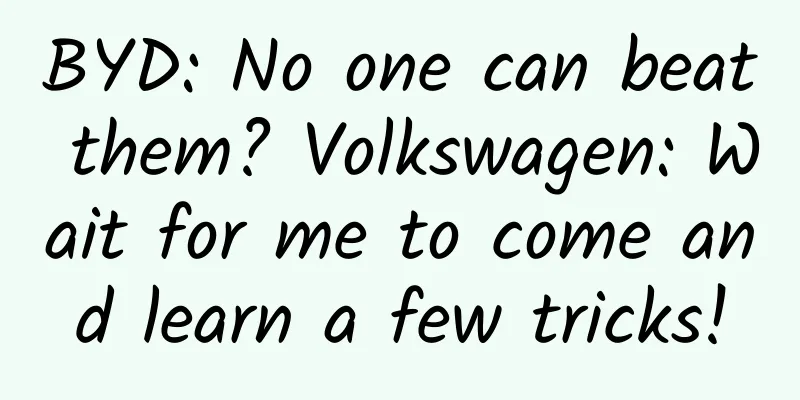BYD: No one can beat them? Volkswagen: Wait for me to come and learn a few tricks!

|
"BMW withdraws from price war" became a hot search. BMW has given a lot of official explanations on this matter, but everyone knows the real reason, which is the famous saying of BYD executive Li Yunfei: If you can't afford to keep up, just pass. With so many joint venture brands engaged in new energy, is there really no one that can compete? Not really. Volkswagen has already shown initial signs of "standing firm" in the new energy field. In the first half of 2024, Volkswagen's sales in China reached 1.2666 million vehicles, making it the second largest brand after BYD and one of only three automobile brands with sales exceeding 1 million vehicles in the first half of the year. What is the level of this achievement? It is roughly equivalent to twice Toyota's sales in China during the same period, three times Honda's, and four times Nissan's. It has preserved a major opportunity for joint venture brands to remain on the table. Why do we say that Volkswagen has the potential to gain a foothold in the new energy market and even compete with BYD? The automobile industry is an industry that values scale. The bigger the scale, the more stable it can be. Volkswagen sold more than 1.26 million vehicles in China in the first half of the year, and is expected to sell about 2.5 million vehicles for the whole year. A giant manufacturer like Volkswagen cannot play the "small and beautiful" game like Weilai and Ideal. If it wants to gain a foothold in the market, it must have scale, just like Toyota and BYD. With such a scale, Volkswagen has the resources and profits to support the development of new energy vehicles; in addition, selling more than 2 million vehicles a year can also maintain the basic base of the dealer network and ensure that the Volkswagen brand will not be forgotten by consumers. In fact, Volkswagen's transformation path is the same as that of Geely now, or BYD a few years ago: maintain the stability of the basic market of fuel vehicles, and use the money earned from fuel vehicles to "support" new energy vehicles. Given the backwardness in the initial stage, it is already a relatively ideal state for Volkswagen to continue on this path. In comparison, the performance of Japanese manufacturers such as Toyota and Honda in China is far from satisfactory. The weak performance of new energy vehicles has led to a collapse in fuel vehicle sales, a loss of brand image, and a collapse of the myth of value retention. It can be said that they have retreated across the board. However, Volkswagen has at least retained the capital for a counterattack. Volkswagen is different from Toyota and Honda. In terms of developing new energy, Toyota and Honda have only tried a little, but Volkswagen is as persistent in new energy as domestic manufacturers. As early as May 2020, Volkswagen acquired 26.47% of the shares of power battery manufacturer Guoxuan High-tech; in November of the same year, it increased its stake in Anhui Volkswagen to 75%; at the end of 2023, it acquired 5% of the equity of Xpeng Motors for US$700 million; in April 2024, Volkswagen announced an investment of 19 billion yuan to upgrade its Hefei production base. Attitude determines everything. This is what manufacturers who really want to develop new energy vehicles should do. Although Volkswagen's new energy sales did not meet expectations, it at least really wants to transform, unlike Akio Toyoda, who, in 2024, still verbally "stabs" electric vehicles from time to time. More importantly, Volkswagen has made some achievements in the field of new energy. Currently, there are 6 models in the ID. series of Volkswagen North and South, covering four market segments: A-class sedans, B-class sedans, compact SUVs, and medium and large SUVs. It has formed its own family design language and initially built a relatively strong product lineup. In June this year, the sales volume of ID.3 was 7,043 units, the sales volume of ID.4 X was 2,760 units, and the sales volume of ID.4 CROZZ reached 4,094 units. All of them have entered the mainstream market, and the sales volume has reached the level of second-tier new car-making forces. It is undeniable that the performance of these models is directly related to the price cut of 40,000 to 50,000 yuan. However, it should be noted that there are many joint venture new energy vehicles that have not been popular even with a large price cut. Volkswagen has at least gained sales after the price cut. In fact, it is not just Volkswagen that is reducing prices, domestic mainstream new energy models are also reducing prices, which is a major industry trend. Volkswagen is huge and can withstand a period of non-profitability. As long as the scale can be gradually increased, the product will naturally open up the market. The Volkswagen ID.3, which costs 160,000 yuan, looks out of touch with reality, but it becomes more approachable when it drops to around 120,000 yuan. Isn't the first thing most consumers look at when buying a car? The sales volume of Volkswagen's new energy vehicles is relatively small, but at least it is on the right track. There is no doubt that Volkswagen is not as good as mainstream domestic manufacturers in terms of new energy core technology. This is mainly due to its lack of internal organizational cohesion. In 2020, Volkswagen established the CARIAD department, which focuses on electrification and intelligent transformation. In the two years since its establishment, it has accumulated losses of 25.8 billion yuan. The software problem remains unsolved, resulting in frequent system software failures in the ID. series electric vehicles. At the end of last year, Volkswagen, which could no longer tolerate it, announced the layoff of 30% of the department's employees. Volkswagen has been too extreme in its new energy technology route, causing its models to be "out of touch with reality". So far, all the ID. series models launched by Volkswagen in China are pure electric models. However, in the Chinese market, pure electric vehicles are not as popular as extended-range vehicles because of range anxiety. BYD is the sales champion of new energy vehicles. It seems that it has two legs: pure electric and plug-in hybrid. But in fact, the four main models of Qin, Han, Tang and Song are more popular among the plug-in hybrid models. The two best performing manufacturers besides BYD, Ideal and Wenjie, also focus on extended-range electric vehicles. The failure of Ideal MEGA proves that consumers' acceptance of pure electric models is not as high as expected. However, these are not big problems and can be solved in the process of development. Volkswagen can gradually solve the problem of insufficient technical strength through independent research and development, equity investment, technical cooperation, etc. With Volkswagen's scale and integration capabilities, its transformation speed will not necessarily be slower than others after achieving certain technological breakthroughs. In addition, Volkswagen's brand influence in China has not declined significantly, which is capital it can use. It can be said that if there is a traditional joint venture manufacturer that can challenge BYD, it is most likely Volkswagen. As a winner of Toutiao's Qingyun Plan and Baijiahao's Bai+ Plan, the 2019 Baidu Digital Author of the Year, the Baijiahao's Most Popular Author in the Technology Field, the 2019 Sogou Technology and Culture Author, and the 2021 Baijiahao Quarterly Influential Creator, he has won many awards, including the 2013 Sohu Best Industry Media Person, the 2015 China New Media Entrepreneurship Competition Beijing Third Place, the 2015 Guangmang Experience Award, the 2015 China New Media Entrepreneurship Competition Finals Third Place, and the 2018 Baidu Dynamic Annual Powerful Celebrity. |
<<: Which tablet system is better? iOS 9 vs. Windows 10
>>: Detailed explanation of Windows 10's Wi-Fi sharing feature
Recommend
Sales volume is ten times higher than OLED. Three reasons determine that quantum dots will be the future of high-end large-screen TVs
As a major consumer of televisions with an annual...
Web Dev: 2017 highlights and 2018 predictions
What exciting events in 2017 have the industry le...
I will go forward despite thousands of people's opposition: Nintendo Switch from a developer's perspective
Recently, Nintendo announced the much-anticipated...
China Shipowners' Association: 2022 International Logistics Industry Digital Development Report
The report deeply interprets the new trend of dig...
Case review + fission methodology | Why is your fission activity ineffective?
The fission gameplay template is important, but w...
Gaoligong, the "World Species Gene Bank" Hidden in the Southwest Border
Gaoligong Mountain stands tall and majestically f...
Huawei's new processor Kirin 650 is fully exposed: the first model will be this one!
After releasing P9, Huawei has another new produc...
Taking advantage of the momentum of "Ode to Joy 2", why is JD.com the only one to dominate the screen?
I know that half of my advertising dollars are wa...
What does it mean when VoLTE appears on a mobile phone?
Some netizens may find a "VoLTE" icon o...
July new media operation and promotion hot calendar!
Whether it is new media, marketing, event plannin...
Do you have promotional abilities?
There are many tasks that operations are responsi...
For every additional source of protein consumed by the Chinese population, the risk of hypertension, diabetes and death decreased by 26%, 31% and 31% respectively.
As we all know, "prevention is the most econ...
Li Chen's personal profile: How to determine whether a website has been punished by Baidu?
If the website traffic drops sharply during opera...
This fish can walk and climb trees. Where did it come from?
Today, the Qinghai-Tibet Plateau is the roof of t...
WeChat has been updated again. Have you noticed these four practical little features?
As a domestic instant messaging tool, WeChat has ...









